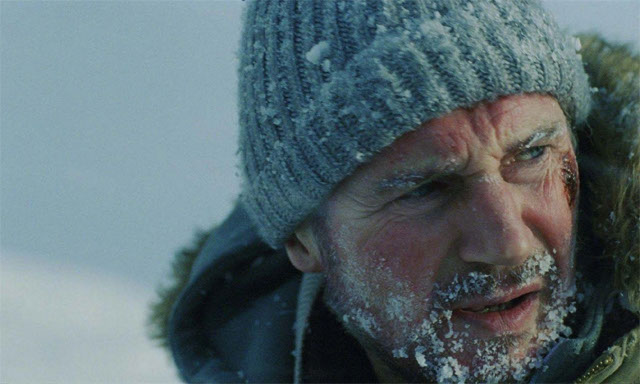
Film: The Grey
Country: USA
Year of Release: 2012
Director: Joe Carnahan
Screenwriters: Joe Carnahan, Ian Mackenzie Jeffers
Starring: Liam Neeson, Dermot Mulroney, Frank Grillo
♥♥♥
Towards the beginning of The Grey, which opened on circuit last Friday, a man named Ottway (Liam Neeson) and a group of workers board a small plane in Alaska on the kind of howling, blustery night that no sane person would fly. As such, when the plane goes down, it’s not much of a surprise. What might surprise viewers, however, is the sheer realism of the crash, so viscerally delivered by director Joe Carnahan, that when Ottway wakes up lying in the snow, with the beginning of frost-bite starting to take hold, it’s an utterly believable moment drenched in hopeless desolation.
The film attempts to keep this conviction alive but very quickly falls prey to a remarkably linear plot structure in which the men find themselves surrounded by a pack of wolves. Ottway, who kills wolves for a living, realises that the men are near the wolves den and are thus considered a threat to the pack. And so begins a kind of icy variation on the ’70s classic Deliverance in which seven men must traverse a landscape that looks very much like hell frozen over, as they get picked off one-by-one by digitally animated wolves.
The rough, gentle beauty of Liam Neeson’s face is tailor-made to walk through a snowstorm., and Neeson looks like nothing if not a survivor as he leads both the film and his band of men with a quiet resigned authority. He is joined by a strong cast that includes Dermot Mulroney and Frank Grillo, although none of the other characters are as carefully written as Ottway.
In its descent into doom, The Grey doesn’t fall into too many obvious traps, but its carefully constructed narrative fails to engage on any deep emotional level and the film feels as cold and heartless as its landscape. I suspect that the producers registered this problem with the film, which would help to explain the brief fragments of flashbacks experienced by some of the characters, particularly Ottway, as he thinks about his former partner. But these moments, brief as they are, are smothered in the golden syrup of sentimentality, and they fail to resonate with the rest of the grim and desolate film, feeling like they’ve literally been tacked on in a post-production attempt provide a little human warmth.
There are a few other moments of shared humanity in The Grey, but these conversations, which mostly take place around makeshift fires, similarly feel as if they’re modular units tacked on to the film. I think the film would have been more successful if it had focused on the shared experience of the men as a kind of bonding agent, rather than looking for redemption in forced moments of humour in a physical and metaphysical landscape that simply doesn’t seem to allow for such laughs. Instead the film treats its characters as a insular individual narratives, as plot strands rather than fully realised people.
For these, and several other reasons, the film doesn’t completely engage. At the same time, its plot and pace don’t conform to the standard arc of most big budget films. There was a palpable sense of surprise at this fact among the Tuesday night audience at Musgrave with whom I watched the film. I’m always happy when films depart from standard Hollywood formulae, and I think that it’s great for mainstream viewers to experience films that offer some kind of alternative vision of cinema. I’m just not convinced that The Grey does a good enough job. It feels uncomfortably stuck between artistic integrity and a desire to entertain, when it really shouldn’t have to choose.
© PETER MACHEN 2017